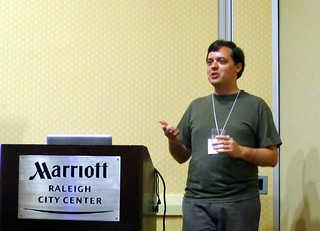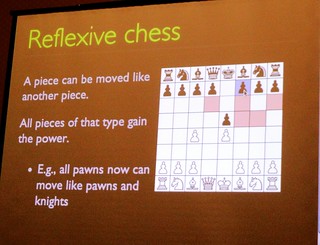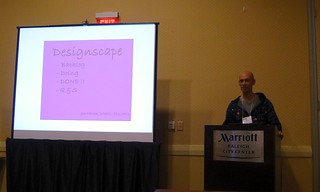In the end
of May Elina Ollila, Anne Sullivan and I held the Workshop on Research
Prototyping in Games [http://wrpg.fdg2012.org/], in Raleigh, NC in junction with
the FDG conference.
I started
out in the morning with the welcome speech, presenting the scope for the
workshop, as well as the schedule. We also did a short presentation round
gauging what expectations everyone had for the day. In short, the scope of the
workshop was to address how actual hands on prototyping work can, as a method,
potentially yield knowledge that would not otherwise emerge. The work process
can also yield new interesting questions because often, the resolution of one
problem can reveal new interesting problems. For this workshop we asked for
submissions of prototypes that are built specifically to explore certain
problems or areas of investigation. We gathered a program committee consisting of equal amounts of
persons working in the industry and universities respectively, all with
extensive experience in the area.
The first
speaker was Mark Nelson, presenting Prototyping Kant-inspired Reflexive Game
Mechanics. Mark presented
varieties of two prototypes in order to illustrate Kant’s maxim that one should
only do actions that one thinks can be made into universal rules. For example,
if one steals, then one would see that as something that would be OK for
everyone to do, or even should do.
One Prototype Mark showed was a Pac Man style game where it was
possible to break down the walls, and where each hole in the wall became
permanent. The other prototype was a variety of chess where it was possible to
change the rules, for example get a pawn to behave as a knight.
In both cases Kant’s maxim was exemplified in that an action was propagated as a rule change, elevating the action to a universal rule. Something that was rewarding to see was that other aspects of game mechanics became interesting in a new way too as a side effect of the exploration of Kantian rule. (Such as how power-ups can be considered to be rule-breakers in some contexts.)
I kept thinking about constitutive rule systems, something that Richard Evans mentioned at a seminar on AI for games in Dagstuhl a few weeks ago. Most rule systems are restrictive rather than constitutive, meaning that the whole rule system is there from the beginning, but that different actants within the system are restricted to certain parts of the rules. Like in a computer role playing game, a character of a certain class can do what the class dictates, depending on the circumstances, being restricted to a part of the rule system. Constitutive rules on the other hand are, as the name suggest, constituted during play. One example is the card game Dominion, and another is the system Evans and Short are building where a character's action potential is defined by what social practices they are currently engaged in. At least that is how I understand the terms. I might be wrong. I digged, after a reference from Richard E., into a paper by John Rawls on the topic: "Two Concepts of Rules" (1955).
To me it seems that what Mark is doing is to take a fixed restrictive rule system, chess, and add constitutional rules to it. In play tests it turned out, not surprisingly, that if rules could be freely changed the game quickly became unplayable (too large combinations space), while that with a few restrictions it was more playable... writing this I remember someone in the audience talking about some interesting chess-hybrid, but the name escapes me. Anyhow, I appreciated Mark's talk a lot; to me it showed that prototyping using computational processes can actually illustrate philosophical stances, which is awesome. Other interesting work in the area is Julian Togelius work on the same maxim by Kant. I also have a fuzzy memory of Richard Evans using his B&W code in an experiment to simulate something...philosophical (argh - beating memory with a stick, but it doesn't help).
In both cases Kant’s maxim was exemplified in that an action was propagated as a rule change, elevating the action to a universal rule. Something that was rewarding to see was that other aspects of game mechanics became interesting in a new way too as a side effect of the exploration of Kantian rule. (Such as how power-ups can be considered to be rule-breakers in some contexts.)
I kept thinking about constitutive rule systems, something that Richard Evans mentioned at a seminar on AI for games in Dagstuhl a few weeks ago. Most rule systems are restrictive rather than constitutive, meaning that the whole rule system is there from the beginning, but that different actants within the system are restricted to certain parts of the rules. Like in a computer role playing game, a character of a certain class can do what the class dictates, depending on the circumstances, being restricted to a part of the rule system. Constitutive rules on the other hand are, as the name suggest, constituted during play. One example is the card game Dominion, and another is the system Evans and Short are building where a character's action potential is defined by what social practices they are currently engaged in. At least that is how I understand the terms. I might be wrong. I digged, after a reference from Richard E., into a paper by John Rawls on the topic: "Two Concepts of Rules" (1955).
To me it seems that what Mark is doing is to take a fixed restrictive rule system, chess, and add constitutional rules to it. In play tests it turned out, not surprisingly, that if rules could be freely changed the game quickly became unplayable (too large combinations space), while that with a few restrictions it was more playable... writing this I remember someone in the audience talking about some interesting chess-hybrid, but the name escapes me. Anyhow, I appreciated Mark's talk a lot; to me it showed that prototyping using computational processes can actually illustrate philosophical stances, which is awesome. Other interesting work in the area is Julian Togelius work on the same maxim by Kant. I also have a fuzzy memory of Richard Evans using his B&W code in an experiment to simulate something...philosophical (argh - beating memory with a stick, but it doesn't help).
Our second speaker was Emmet Tomai, who presented An MMORPG Prototype for
Investigating Adaptive Quest Narratives and Player Behavior. Emmet showed the prototype which is built in
Unity 3D, using the SmartFox Server 2X and MySQL. Emmet and his colleagues are
investigating how it can be possible to improve "trade-off between the ability for
authors to tell motivating narratives and the ability for players to change the
world", which in my humble opinion is one of the most important issues of
gaming to address. And in order to do so they need to build something
own from scratch. My applauds! In this phase they are experimenting with
different types of quest generation. (Very close to what Anne is doing.) I'll be following their future work as closely
as I can.
After the break we had two speeches about methods for prototyping. Jon
Manker presented his game prototyping the tool DesignScape, which we
actually tried out in the afternoon prototyping session, and Elina gave an
overview of different prototyping- and assessment methods.
We went to lunch together, talking about what to prototype in the
afternoon. I'll write about that in the next post.




